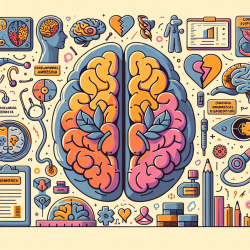Introduction
Huntington's disease (HD) is a neurodegenerative condition that profoundly impacts the lives of those affected and their families. As a speech-language pathologist dedicated to improving children's outcomes, understanding the intricacies of HD can enhance your practice and empower you to make informed, data-driven decisions. A recent study, "Beyond the clinical context: the process of losing oneself living with Huntington’s disease," sheds light on the personal experiences of individuals with HD and offers valuable insights for practitioners.
Understanding the Study
The study involved 33 participants, either affected by or at risk for HD, and utilized Grounded Theory to explore their experiences. The core finding was the "loss of sense of self until death," illustrating how HD transforms individuals' lives. The study identified several subcategories, including recognizing oneself at risk, unawareness, growing awareness, dependency, and the impact on caregivers.
Key Insights for Practitioners
- Recognizing the Risk: Individuals at risk for HD often face uncertainty about their future. Practitioners can support these individuals by providing genetic counseling and education about HD, helping them make informed decisions about genetic testing and family planning.
- Addressing Unawareness: Many individuals with HD experience anosognosia, a lack of awareness of their condition. Speech-language pathologists can play a crucial role in raising awareness and providing strategies to manage daily activities safely.
- Supporting Growing Awareness: As individuals become more aware of their symptoms, they may experience emotional and psychological challenges. Practitioners can offer support through therapy and counseling, helping them cope with the changes and maintain their quality of life.
- Managing Dependency: HD leads to increased physical and cognitive dependence. Practitioners can work with caregivers to develop strategies for effective communication and care, ensuring the individual's needs are met while reducing caregiver burden.
- Empowering Caregivers: Caregivers often face significant emotional and physical challenges. Providing resources, support groups, and education can empower caregivers to manage their responsibilities effectively and maintain their well-being.
Encouraging Further Research
The study highlights the need for continued research into the personal experiences of individuals with HD. By understanding the disease from a holistic perspective, practitioners can develop more effective interventions and support systems. Encouraging collaboration between researchers, healthcare professionals, and families can lead to innovative solutions that improve the lives of those affected by HD.
Conclusion
Understanding the complexities of Huntington's disease is crucial for speech-language pathologists and other healthcare professionals dedicated to improving patient outcomes. By embracing the insights from this study, practitioners can enhance their skills, provide better support to individuals with HD and their families, and contribute to the ongoing research in this field.
To read the original research paper, please follow this link: Beyond the clinical context: the process of losing oneself living with Huntington’s disease.










